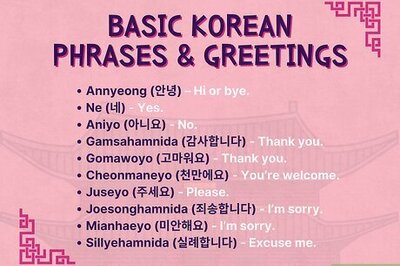
views
A country’s foreign policy has to reflect the change in its external relations and international developments. If it is true that in international relations, there are no permanent friends or permanent enemies, only permanent interests, then a country’s foreign policy cannot be static. That does not mean that trust or principles have to be altogether absent in foreign policymaking and that it should be based only on pure pragmatism. A blend of consistency and adapting to changing circumstances, the ability to take advantage of new opportunities and redefine the national interest as required should ideally be the basis of foreign policy formulation.
Our own foreign policy has undergone many changes in the course of years. China was a “brother” at one time, but is now an adversary. We have suffered at the hands of the US for decades, but it is today our close strategic partner. Our relations with Egypt under Nasser and Sadat were very different. Our ties with the Gulf monarchies have been totally transformed. We were amongst the founders of the non-aligned movement, but now nonalignment has disappeared from our diplomatic lexicon. Nearer home, the changes that have occurred in our ties with Bangladesh show how conducive circumstances can reshape policies. There are many such examples of evolution in our foreign policy as contexts change.
All this is relevant to the needless domestic political controversy that has arisen over the government’s position on the Israel-Hamas conflict and, in particular, our abstention on the resolution moved by Jordan in the UN General Assembly seeking a ceasefire in Gaza and the provision of humanitarian assistance to its beleaguered civilian population. In the absence of any reference in the resolution to the October 7 horrific terrorist attacks on Israel which India did not want to be glossed over, India chose to abstain.
The terrorism issue is one of vital concern for India. We have suffered from jihadi terrorism for years, and this continues at a relatively low level even today, largely because Pakistan is in a dire economic situation, needs external bailouts, and extracted itself from the FATF grey list with difficulty, besides being in a mess politically. Its “strategic depth in Afghanistan” ambitions centred on the installation of the Taliban regime in Kabul have backfired, with the Pakistani Taliban now conducting terrorist activity from Afghan soil against its earlier sponsor. Pakistan is hardly in a position therefore to re-open the terrorist front against India anew.
But India is not letting up its guard. It is active on all forums to gain acceptance for the proposition that the international community must combat terrorism unitedly and that no cause justifies the recourse to terrorism. In that background, Prime Minister Modi wanted to extend India’s solidarity with Israel following the horrific terrorist attacks against its civilian population on October 7. This solidarity was unrelated to the larger political issue of the rights of the Palestinians to a separate sovereign state of their own, on which the External Affairs Ministry subsequently issued a detailed statement in favour of Palestine.
India has been traditionally a strong supporter of the Palestinian cause, to the point that in 1974 it became the first non-Arab country to recognise the Palestine Liberation Organisation (PLO) as the sole and legitimate representative of the Palestinian people, and in 1988, India became one of the first countries to recognise the State of Palestine. Ties between Indira Gandhi and Yasser Arafat within the non-aligned movement were personally very close. Prime Minister Narendra Modi visited Palestine in February 2018, in the first-ever visit by an Indian Prime Minister to Palestine. President Mahmoud Abbas, in turn, has visited India five times—in 2005, 2008, 2010, 2012 and in 2017.
The geopolitical context of India’s deep support for Palestine was the Cold War, the nonaligned movement, India’s difficult ties with the US, close ties with the Soviet Union, the insecurities the developing world felt within the West-dominated international system, and anti-colonial sentiments. The anti-Israel sentiments of India’s Muslim community also influenced India’s approach to Israel.
India had shunned Israel diplomatically since its creation and took positions against it in the UN. We established diplomatic ties with it only in 1992 after the launch of the Madrid Peace Conference in December 1991. Since then India-Israel ties have progressed rapidly in many areas. In defence, India is Israel’s largest partner for military sales. In trade, India is the third largest partner of Israel in Asia. Counter-terrorism is an important feature of bilateral cooperation, as is cooperation in agriculture and industrial and technological sectors.
Just as India’s ties with Israel have expanded, Islamic countries like the UAE, Bahrain, Morocco and Sudan have normalised ties with Israel too. They have not held these ties hostage to the settlement of the Palestinian question. Far from it, they have ignored Prime Minister Benjamin Netanyahu’s determination to bury the two-state solution with the expansion of Jewish settlements in the West Bank. Even Turkey’s President Recep Tayyip Erdogan, now excoriating Israel for pummeling Gaza took the step to restore diplomatic ties with Israel.
Knowing the deep US support to Israel, these Arab countries accepted the Abraham Accords which were intended to build a new West Asia built on partnership between the Arab states and Israel based on mutually beneficial economic and technological cooperation. This concept excluded the political centrality of the Palestinian question in Israel-Arab relations. Saudi Arabia was also on the verge of normalising ties with Israel, and this while Netanyahu was in power.
It is this political churn in West Asia that made the I2U2 possible, this quadrilateral cooperation between India, Israel, UAE and the US. The announcement of the India-Middle East-Europe Economic Corridor linking India to Europe through UAE, Saudi Arabia, Jordan and Israel announced at the G20 summit in New Delhi, testified to the vast geopolitical change in this region.
These developments required India to reshape its policies in West Asia. Our earlier exclusive support for Palestine at the cost of Israel made no sense any more. Neither did ignoring the Palestinian cause altogether. Israel may have animosity towards the Palestinians, but India does not have any. Our need is to develop a new balance in our West Asia policy in which our interests both with regard to Israel and the Palestinian cause find due space.
While supporting Israel in the face of the terrible terrorist attacks it has suffered, including the taking of hostages, India has also reiterated its support for a sovereign, independent and viable Palestinian state living side by side in peace with Israel. India has also sent humanitarian aid to Gaza, recognising the humanitarian tragedy of Israel’s devastating response to the terrorist attacks by Hamas. Prime Minister Modi has spoken to leaders in the region, including the PLA chief Abbas.
India is maintaining a difficult but necessary balance in a complex situation.
Kanwal Sibal is a former Indian Foreign Secretary. He was India’s Ambassador to Turkey, Egypt, France and Russia. Views expressed in the above piece are personal and solely that of the author. They do not necessarily reflect News18’s views.




















Comments
0 comment